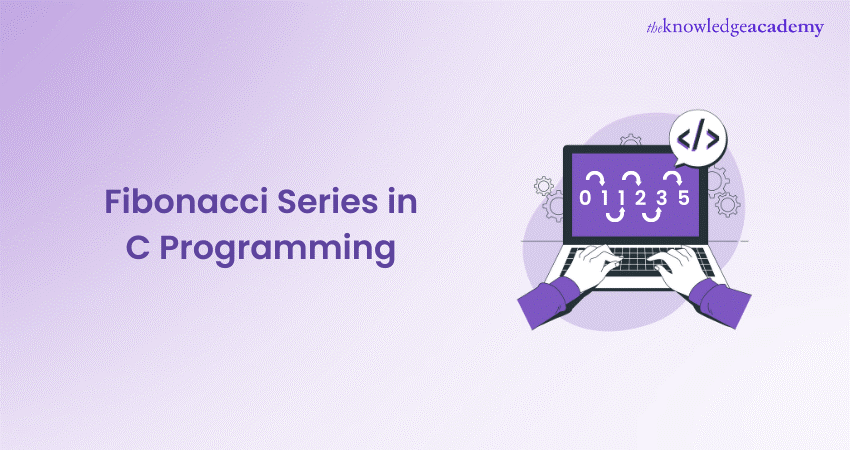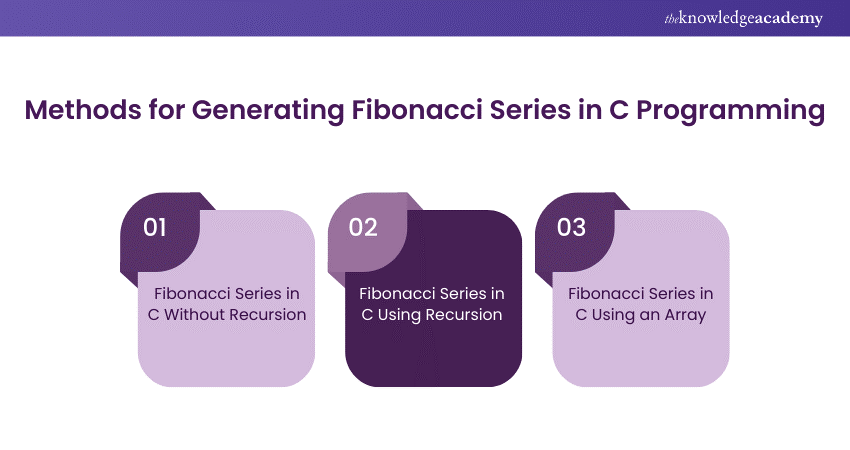We may not have the course you’re looking for. If you enquire or give us a call on 01344203999 and speak to our training experts, we may still be able to help with your training requirements.
Training Outcomes Within Your Budget!
We ensure quality, budget-alignment, and timely delivery by our expert instructors.

Are you curious to know about the Fibonacci Series in C programming? This fascinating sequence appears everywhere in nature and art. Understanding it can enhance your coding skills significantly!
In this blog, we will break down the Fibonacci Series in C step by step. Whether you’re a beginner or looking to refresh your knowledge, this article is for you. We’ll simplify complex concepts, making it easy to grasp. Join us on this journey to explore the beauty of Fibonacci in C!
Table of Contents
1) What is Fibonacci Series?
2) Methods for Generating Fibonacci Series
a) Fibonacci Series in C Without Recursion
b) Fibonacci Series in C Using Recursion
c) Fibonacci Series in C Using an Array
3) Conclusion
What is Fibonacci Series?
The Fibonacci series is a sequence of numbers where each number is the sum of the two preceding ones, starting from 0 and 1. The series typically begins with 0 and 1, and each subsequent number is the sum of the previous two. This sequence is named after the Italian mathematician Leonardo of Pisa, who is also known as Fibonacci.
The Fibonacci series has numerous applications in mathematics, computer science, and even nature, where it appears in various biological settings such as the branching of trees, the arrangement of leaves on a stem, and the fruit sprouts of a pineapple.
The first few numbers in the Fibonacci series are: 0, 1, 1, 2, 3, 5, 8, 13, 21, and so on. The mathematical formula for finding the nth Fibonacci number is:
F(n)=F(n−1) +F(n−2)
where F (0) =0 and F (1) =1.
In C programming, generating the Fibonacci series is a common exercise, and there are multiple ways to implement it. This blog will explore three methods to generate the Fibonacci series in C: without recursion, using recursion, and using an array.
Methods for Generating Fibonacci Series
In C programming, there are multiple ways to generate the Fibonacci series, each with its unique approach and efficiency. Here we will explore three methods: iterative, recursive, and array-based implementations. Each method offers a distinct way to tackle this classic problem.

Fibonacci Series in C Without Recursion
One of the simplest ways to generate the Fibonacci Series in C is by using an iterative approach, which doesn’t involve recursion. This method is straightforward and efficient as it avoids the overhead associated with recursive function calls.
Here’s a C program to generate the Fibonacci Series without recursion:
|
#include int main() { int n, first = 0, second = 1, next; printf("Enter the number of terms: "); scanf("%d", &n); printf("Fibonacci Series: %d %d", first, second); for (int i = 3; i <= n; i++) { next = first + second; printf(" %d", next); first = second; second = next; } return 0; } |
Output:
|
/tmp/2XxdirDFc2.o Enter the number of terms: 3 Fibonacci Series: 0 1 1 === Code Execution Successful === |
Fibonacci Series in C Using Recursion
Recursion is a technique in programming where a function calls itself. The Fibonacci Series is a natural fit for a recursive approach because the nth term is defined in terms of the previous two terms.
However, this method is less efficient than the iterative approach, especially for large values of n, due to the repeated calculations of the same Fibonacci numbers.
Here’s a C program to generate the Fibonacci Series using recursion:
|
#include int fibonacci(int n) { if (n == 0) return 0; else if (n == 1) return 1; else return (fibonacci(n - 1) + fibonacci(n - 2)); } int main() { int n; printf("Enter the number of terms: "); scanf("%d", &n); printf("Fibonacci Series: "); for (int i = 0; i < n; i++) { printf("%d ", fibonacci(i)); } return 0; } |
Output:
|
/tmp/w7jTF9jOop.o Enter the number of terms: 9 Fibonacci Series: 0 1 1 2 3 5 8 13 21 === Code Execution Successful === |
Learn the Language that Powers the Tech World. Join our C Programming Course and Code like a pro! - Register now.
Fibonacci Series in C Using an Array
Another method to generate the Fibonacci Series is by using an array. This method stores all the Fibonacci numbers in an array, which can be useful if you need to access all the values later in the program. This method also avoids the inefficiencies of recursion and provides a clear way to manage the sequence.
Here’s a C program to generate the Fibonacci Series using an array:
|
#include int main() { int n; printf("Enter the number of terms: "); scanf("%d", &n); int fibonacci[n]; fibonacci[0] = 0; fibonacci[1] = 1; for (int i = 2; i < n; i++) { fibonacci[i] = fibonacci[i - 1] + fibonacci[i - 2]; } printf("Fibonacci Series: "); for (int i = 0; i < n; i++) { printf("%d ", fibonacci[i]); } return 0; |
Output:
|
/tmp/YXRUjuZ836.o Enter the number of terms: 6 Fibonacci Series: 0 1 1 2 3 5 === Code Execution Successful === |
Unlock your Coding Potential and Build Robust Applications with our Expert-led C# Programming (C Sharp) Course. Start today!
Conclusion
The Fibonacci Series is a fundamental concept in mathematics and programming, often serving as a great exercise for beginners. This blog covered three methods for generating the Fibonacci Series in C programming. Each method has its strengths and weaknesses, with the iterative approach being the most efficient, recursion being a natural but less efficient solution, and arrays providing a structured way to store the sequence.
Elevate your coding journey! Join in our C++ Programming (C Plus Plus) Course and turn your passion into powerful programming skills.
Frequently Asked Questions

Handle Segmentation Faults by checking for null pointers, ensuring array bounds, initialising variables, and using correct pointer arithmetic. Employ systematic debugging techniques to identify and fix the root cause of the fault.

GNU Debugger (GDB) is commonly used to find Segmentation Faults. It allows you to trace the program's execution, inspect variables, and pinpoint where the fault occurs, helping you diagnose and fix the issue.

The Knowledge Academy takes global learning to new heights, offering over 30,000 online courses across 490+ locations in 220 countries. This expansive reach ensures accessibility and convenience for learners worldwide.
Alongside our diverse Online Course Catalogue, encompassing 19 major categories, we go the extra mile by providing a plethora of free educational Online Resources like News updates, Blogs, videos, webinars, and interview questions. Tailoring learning experiences further, professionals can maximise value with customisable Course Bundles of TKA.

The Knowledge Academy’s Knowledge Pass, a prepaid voucher, adds another layer of flexibility, allowing course bookings over a 12-month period. Join us on a journey where education knows no bounds.

The Knowledge Academy offers various C Programming, including the C Programming Course, C++ Programming Course, and Introduction Of Embedded C Programming Course. These courses cater to different skill levels and provide comprehensive insights into C vs Java.
Our Programming & DevOps Blogs cover a range of topics related to Programming & DevOps, offering valuable resources, best practices, and industry insights. Whether you are a beginner or looking to advance your Programming & DevOps Skills, The Knowledge Academy's diverse courses and informative blogs have got you covered.
Upcoming Programming & DevOps Resources Batches & Dates
Date
 C Programming
C Programming
Thu 19th Sep 2024
Thu 19th Dec 2024
Thu 23rd Jan 2025
Thu 20th Mar 2025
Thu 22nd May 2025
Thu 17th Jul 2025
Thu 18th Sep 2025
Thu 20th Nov 2025







 Top Rated Course
Top Rated Course



 If you wish to make any changes to your course, please
If you wish to make any changes to your course, please


